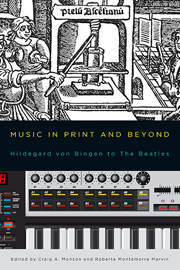Book contents
- Frontmatter
- Dedication
- Contents
- Acknowledgments
- Introduction
- 1 Robert Granjon and Music during the Golden Age of Typography
- 2 Publishing Music Theory in Early Cinquecento Venice and Bologna: Friends and Foes
- 3 Preaching to the Choir: Arts of Persuasion in the Converts of Italy
- 4 Music Distribution in London during Handel's Lifetime: Manuscript Copies versus Prints
- 5 Beethoven's Miniatures
- 6 “The Beautiful and the Ugly”: Travel Literature, Racial Theory, and a Schumann Song
- 7 Verdi's “Music of the Future”
- 8 The Suspended Voice of Amália Rodrigues
- 9 More than Mostly Mozart: Teddy Wilson's “China Boy”
- 10 Wanted Dead and Alive: Historical Performance Practice and Electro-Acoustic Music from IRCAM to Abbey Road
- 11 Lowinsky's Secrets
- 12 The Unknown Hildegard: Editing, Performance, and Reception (An Ordo Virtutum in Five Acts)
- List of Contributors
- Index
6 - “The Beautiful and the Ugly”: Travel Literature, Racial Theory, and a Schumann Song
Published online by Cambridge University Press: 05 March 2014
- Frontmatter
- Dedication
- Contents
- Acknowledgments
- Introduction
- 1 Robert Granjon and Music during the Golden Age of Typography
- 2 Publishing Music Theory in Early Cinquecento Venice and Bologna: Friends and Foes
- 3 Preaching to the Choir: Arts of Persuasion in the Converts of Italy
- 4 Music Distribution in London during Handel's Lifetime: Manuscript Copies versus Prints
- 5 Beethoven's Miniatures
- 6 “The Beautiful and the Ugly”: Travel Literature, Racial Theory, and a Schumann Song
- 7 Verdi's “Music of the Future”
- 8 The Suspended Voice of Amália Rodrigues
- 9 More than Mostly Mozart: Teddy Wilson's “China Boy”
- 10 Wanted Dead and Alive: Historical Performance Practice and Electro-Acoustic Music from IRCAM to Abbey Road
- 11 Lowinsky's Secrets
- 12 The Unknown Hildegard: Editing, Performance, and Reception (An Ordo Virtutum in Five Acts)
- List of Contributors
- Index
Summary
Whenever something is published, it has the possibility of becoming the proverbial stone thrown into a pond, with ripples traveling farther and farther away from the original object. If we emend the fluid analogy so that the ripples themselves become publications, we have a rough analogy for the intricate “back story” of certain nineteenth-century songs, in which scholarly, political, and historical prose publications become sources of ideas for a poem that is subsequently set to music, in a process that might extend over years or decades. With each new ripple, the context changes, the audience is different, the currents shift in response to altered circumstances. What follows is a case history of this sort of “ripple effect” in which a late-eighteenth-century scholarly journal lurks behind a poem from the 1820s, and the poem in turn engenders an extraordinary song with resonances in the political climate of the 1840s.
Schumann and ethnography are not categories one ordinarily encounters cheek-by-jowl. But in one of his most unusual songs, “Abends am Strand” (Evenings on the beach), op. 45, no. 3, this composer chose a poem by Heinrich Heine, “Wir saßen am Fischerhause” (We sat by the fisherman's house), in which that supreme ironist compounds romantic Wanderlust, Bildung via travel literature, and confrontations of German “Kulturmensch” with the “Other” in a potent lyrical package. Among the panoply of sources to which Heine's words respond was a journal founded by the prolific ethnographer Christoph Meiners, whose outpourings the young Heine read in the ducal library in Düsseldorf before he went to university in Göttingen in 1820.
- Type
- Chapter
- Information
- Music in Print and BeyondHildegard von Bingen to The Beatles, pp. 129 - 157Publisher: Boydell & BrewerPrint publication year: 2013

